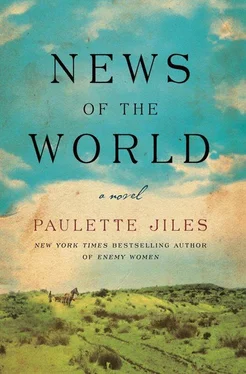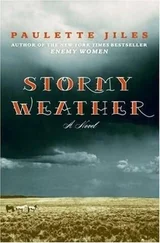The messenger said, No, I do not think they will. Because then they would be legally obligated to support her and according to custom to provide her with a dowry. They did not adopt the nephew.
Well, said the Captain. I understand. He was tightening up inside somehow, his throat seemed to thicken.
The man took hold of the Captain’s sleeve. He said, You cannot leave her here.
The Captain felt something close to despair. He said, Thank you sir. Perhaps I could at some time stop for a visit. Now I must be going.
He had to leave, quickly, before tears started running down his face.
HE TURNED BACK the way he had come, drove to the east along the straight-line road, the long twenty-two miles into Castroville. There he stayed at the inn on the Medina and listened all night to the tumbling roar of the grist-mill wheel that turned over the green alluvial water of the Medina River. The next morning he shaved closely and put on his black reading clothes and then went on into San Antonio.
He crossed over Alazan Creek at the ford where he was happy to see Mexican women wading in the water, baskets of wet clothes on their heads, calling and chatting to one another and wringing out their long black hair in the warm April air. They called out saucy things to him in Spanish which they did not think he understood and then cried out in surprise when he answered them back in the same language. They then laughed and splashed water at him and he was very glad to be back in San Antonio.
He was happy also to hear the bells of San Fernando ringing out the hour, and a man whose hair was as white as his own stood up in his buggy and called out, Jefferson Kidd! Come and see me sir! He went down a narrow street of stone houses, hoarding the cool of their courtyards, so that the streets in the center of town were all one long white wall in the style of houses in southern towns since the times of the Romans. Other two-storied houses, casas de dueña, town houses for rancheros who had their grazing lands out on the Balcones Heights had second-story balconies of wrought iron that made lacy shadows on the walls below.
It was late evening when he came across the San Martin Street Bridge and then Calamares Street and into the Plaza de Armas. The Spanish Governor’s palace, built in 1749 in ruins. There in the wide Plaza de Armas, Military Plaza, were lines of wagons bringing in grain and vegetables and hay to be sold there, and the chili stands with their piles of fruit and simmering cauldrons of chili now lit by lanterns with colored shades. Packed around the square were the commercial establishments, The Vance House, Lessner and Mandelbaum hide dealers, Rhodes and Dean tinware, clothing shops, billiard rooms, carriage repositories. The Captain put the excursion wagon with its promises of curative waters and its bullet holes in a carriage repository and stabled Fancy and Pasha in Haby’s stables, each one devouring a great net bag of hay. He checked in at The Vance House and passed a fitful and unhappy night.
The next day he walked out into the Plaza and saw his old print shop next to Advocate Branholme’s building. It was now full of broken carriage wheels to be repaired and parts of some kind of machinery. He cupped his hands around his face and looked in; dust on the floor, the Stanhope press sold and gone and probably taken to pieces for parts, a bag of wool scraps, a shoe.
He went next door to Branholme’s law office.
Branholme was in, and stood when he saw the Captain. He spoke for thirty minutes or so with the young lawyer about adoption, about the legal status of returned captives, about the Printing Bill.
Branholme said, In a few years perhaps they will rescind the bill. After Davis is gone and after the military is no longer in power. Then it might be feasible to start up your business again. And as for the captives, well, they belong to their parents or guardians.
Captain Kidd then rode Pasha through the traffic, away from the center of town and down the San Antonio River to the ruins of Mission Concepción. Somewhere under layers of legalities they had land there. It was his favorite of all the old missions even though now the main sanctuary was abandoned and scarred with people’s names carved into the plaster. He would leave it to Elizabeth. He knew Señor De Lara all too well. The man was a scholar and an expert in Spanish Colonial land grants and his first words would be, But you do not stand to inherit, sir. Only your daughters, and so I will discuss it with them.
He rode back and went to the post office and inquired for letters. He sat down on the steps with the four pages from Elizabeth. He knew her handwriting immediately.
They would come back in two years. Dearest Papa you know we long for Texas but . . . She wrote of the long journey and of their weariness, of Olympia’s delicacy. They were lacking money and would need to buy horses and who knew how they would now get across the Mississippi? If he had money to send them for the trip, they needed it. Would it be possible to rent the old Betancort house? They were, after all, Mama’s people. She had written already to Sr. De Lara concerning the Mission Concepción land.
Newspaper readings would not be well attended here or any big city to the south and east. All the larger cities of Texas had a daily distribution of newspapers fresh from the coast. They came in on the boats at Galveston and Indianola and others came down on the train from St. Louis. Strange to think of children being kidnapped by the Comanche and Kiowa, of attacks by raiding parties, while the telegraph and the steam locomotives marched out of the maw of Progress but so it was. His readings were popular only in small towns in the north and west, like Dallas and Fort McKavett, places near the frontier.
So he bought a new set of newspapers from the Southern cities, the Memphis Daily Appeal, the Columbus, Georgia, Bugle, along with those from cities in the northeast. He returned to The Vance House and sat up late with his newspapers and smoked and paced the room. He could not sleep. Finally he went down to the lobby and sent a boy out for a pint of whiskey from Milligans. You could trust their whiskey. He loved this town and its river. It was very old. He looked out at the oil-burning streetlamp through the glass of whiskey to see it shiver in tones of gold and brass. And so am I, he thought. But I am not a cripple and I am not stupid.
THE NEXT MORNING he drove down the Castroville Road with Pasha tied on behind as always. He did not know what to tell himself except that perhaps Anna and Wilhelm just needed the right kind of information or the ability to imagine what it was like for a child taken captive and then redeemed and then adopted by virtual strangers, yes adopted, you miserly coldhearted beasts. He would try. Reason, bribery, whatever it took.
Then he would go on north.
It was night by the time he had reached D’Hanis. He turned down the Leonberger farm road and thought that perhaps by this time they would be happy to get rid of her. Maybe not. He had no idea one way or the other. He doubted if they could make her work. Perhaps with severe beatings.
As he came toward the farm he stopped by a grove of mesquite trees. He could see a light shining in the farmhouse window. He sat quietly for a while with his knuckles under his nose, thinking.
Then he saw Johanna alone in the flat, grassy field. She had several heavy leather halters over her shoulder and walked clumsily because of a bucket she held in both hands. They had sent her out into the field alone, after dark, to get the horses. She trudged through the April grass. She was calling to the horses in Kiowa, softly, secretly. She was staggering on the uneven ground, under the weight of the halters and a wooden bucket of shelled corn and her ragged taffy hair flew in strands around her shoulders. She was only ten, sent out into the dark with twenty pounds of halters and corn and the heavy wooden bucket. Into a landscape she did not know.
Читать дальше












